The conference was held live from the central bridge at Dien Hong Hall, National Assembly House; combined online to 21 thousand bridges at provincial, municipal and central party committees; central departments, ministries, branches, public service units and district and commune-level bridges nationwide, with about 1.5 million delegates attending.
General Secretary To Lam attended and gave a speech at the Central bridge. Also attending at the Central bridge were Politburo members: Luong Cuong, President; Pham Minh Chinh, Prime Minister; Tran Thanh Man, Chairman of the National Assembly; former Politburo members, former Chairmen of the National Assembly: Nguyen Sinh Hung, Nguyen Thi Kim Ngan; Comrade Tran Cam Tu, Politburo member, Standing member of the Secretariat; Politburo members, Secretaries of the Party Central Committee: Nguyen Trong Nghia, Head of the Central Propaganda and Education Commission; Le Minh Hung, Head of the Central Organization Commission.
Also attending at the Central bridge were Minister of Science and Technology Nguyen Manh Hung and Deputy Ministers of Science and Technology.
Comrade Nguyen Minh Triet, former Politburo member, former President attended at Binh Duong; comrades: Truong Tan Sang, former Politburo member, former President; Nguyen Tan Dung, former Politburo member, former Prime Minister attended at Ho Chi Minh City.
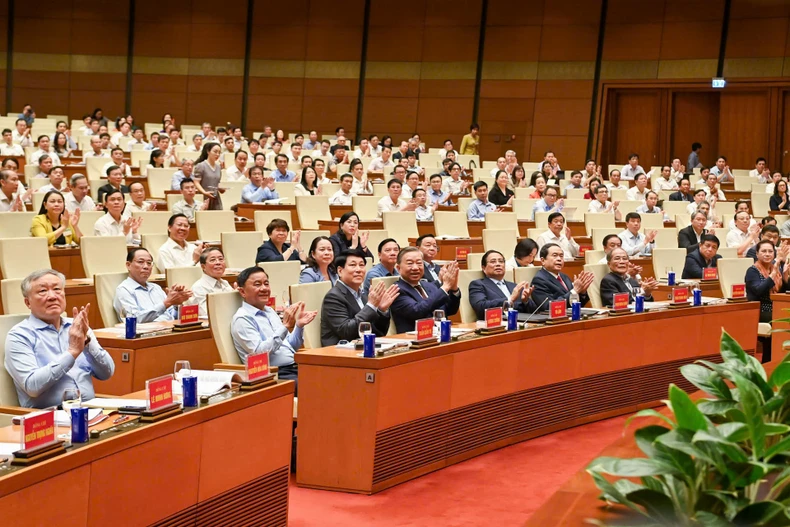
Attending the conference at the connecting points were comrades: Politburo members, Secretariat members, Central Party Committee members, alternate members of the Central Party Committee; comrades leading departments, ministries, branches and mass organizations at the Central level; key cadres at provincial, district and commune levels of 63 provinces and cities nationwide; comrades reporting at the Central level, reporting at provincial and district levels.
This is a particularly important conference, thoroughly grasping the core contents, new points, and focus of the documents of the 11th Conference of the 13th Party Central Committee. At the conference, delegates listened to 3 topics with rich and in-depth content.
Many new and highly feasible points in the documents submitted to the 14th National Party Congress
Prime Minister Pham Minh Chinh introduced the topic of draft documents submitted to the 14th National Party Congress: New points in summarizing a number of theoretical and practical issues on the socialist-oriented renovation process over the past 40 years in Vietnam; New points in the draft Report summarizing the work of Party building and implementation of the Party Charter submitted to the 14th National Party Congress; New points in the draft Political Report; New points in the draft Report on 5 years of implementing the 10-year socio-economic development strategy 2021-2030; directions and tasks for socio-economic development in the 5 years 2026-2030.
According to Prime Minister Pham Minh Chinh, the draft documents submitted to the 14th National Party Congress have been supplemented and perfected in terms of revolutionary, actionable, highly feasible, concise, focused, and at the same time ensuring the high generality of the Party Congress documents.
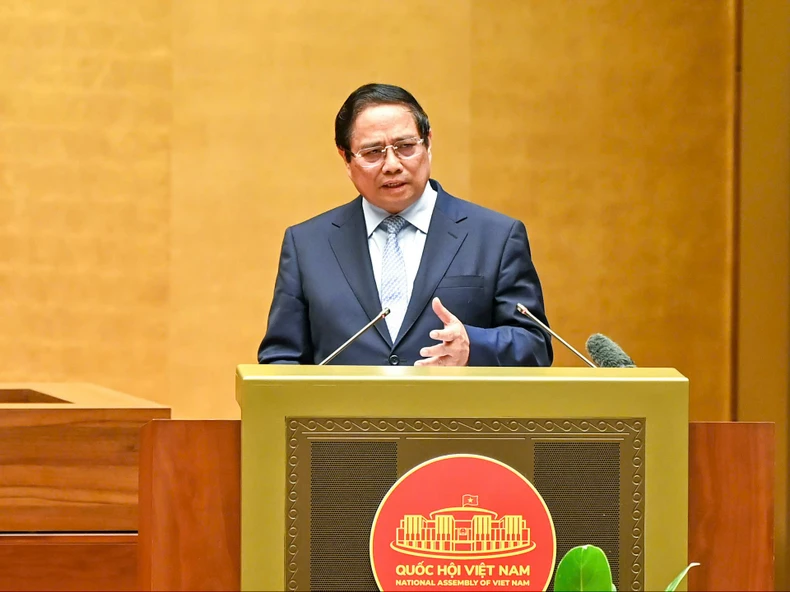
Prime Minister Pham Minh Chinh introduced the topic of draft documents to be submitted to the 14th National Party Congress.
Regarding the new points in the draft Report summarizing a number of theoretical and practical issues on the socialist-oriented renovation process in Vietnam over the past 40 years, the Prime Minister commented that the report has added content analyzing the context and situation; affirming the completion of Vietnam's path to socialism based on three main pillars: socialist democracy; socialist rule of law state; socialist-oriented market economy. Throughout that process, taking people as the center and subject, not sacrificing the environment, civilization, fairness, and social progress to pursue pure growth, fast growth, but must be sustainable.
Emphasizing the new points in the draft Political Report, the Prime Minister said that, on the basis of adding the elements of self-reliance, self-confidence, and strong progress in the era of national rise and editing, ensuring it is short, concise, clear, and has a strong appeal and action, the Central Committee agreed on the theme of the 14th Congress as: "Under the glorious flag of the Party, joining hands and being determined to successfully implement the country's development goals by 2030; self-reliance, self-confidence, and strong progress in the era of national rise for peace, independence, democracy, wealth, prosperity, civilization, happiness, and steady steps towards socialism".
Introducing new points in the draft Report summarizing the Party building work, the Prime Minister stated that the Central Committee agreed to supplement the assessment and emphasize a number of outstanding results. In particular, it affirmed that the Party building work during the 13th Congress term was truly placed in a "key" position by the Central Executive Committee, the Politburo, the Secretariat and Party committees and organizations at all levels... The implementation of the 10 tasks on Party building set out by the 13th Congress, especially a number of revolutionary policies and tasks, was focused on by the Central Committee, the Politburo and the Secretariat with very new, drastic, effective, comprehensive, synchronous and profound implementation methods, achieving very important results.
Regarding the new points in the draft Report on the 5-year implementation of the 10-year socio-economic development strategy 2021-2030 and the directions and tasks for socio-economic development in the 5-year period 2026-2030, the Prime Minister said that the results of socio-economic development in the 5 years of 2021-2025, supplemented and emphasized the following contents: In the last 2 years of the term, focusing on drastic direction, issuing many policies, creating many historical marks, especially implementing the revolution in organizing the apparatus of the political system towards streamlining, compactness, strength, efficiency, effectiveness and efficiency; merging a number of provincial-level administrative units; implementing the 2-level local government model; public debt, government debt, foreign debt are well controlled...
Regarding the forecast of the situation, viewpoints and development goals for the period 2026-2030, the draft Socio-Economic Report proposes 11 main groups of tasks and solutions; including some new contents on: perfecting institutions, mobilizing resources; developing the private economy, clearly identifying the private economic sector as the most important driving force of the economy; drastically implementing breakthroughs in science, technology development, innovation and digital transformation.
Special attention is paid to collecting public opinions on amending and supplementing the Constitution.
National Assembly Chairman Tran Thanh Man introduced the topic: Amendment of the Constitution and laws; Directions for the election of deputies to the 16th National Assembly and People's Councils at all levels for the 2026-2031 term.
National Assembly Chairman Tran Thanh Man stated that the amendment of the Constitution and laws must meet the requirements of merging provincial-level administrative units, not organizing district-level units, merging commune-level units, and building a two-level local government organization model; arranging socio-political organizations and mass associations assigned by the Party and State into the Vietnam Fatherland Front... opening up a new situation for national development in a new era with a long-term vision.
To meet these two requirements, the scope of amendments and supplements to the Constitution focuses on two groups of contents. That is, the provisions of the 2013 Constitution related to the Vietnam Fatherland Front and socio-political organizations to meet the requirements of arranging and streamlining the organizational apparatus, promoting the role, responsibility, and proactiveness of the Vietnam Fatherland Front, the role of gathering classes and strata, focusing on residential areas, close to the people, and to each household. The provisions in Chapter 9 of the 2013 Constitution are to implement the model of organizing a two-level local government.
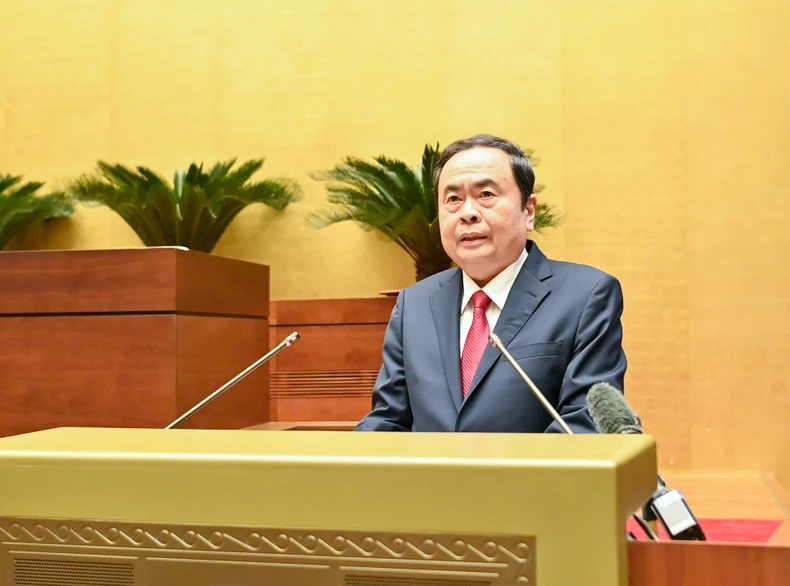
National Assembly Chairman Tran Thanh Man introduces the topic of amending the Constitution and laws
As of April 14, 2025, at the 9th Session, the National Assembly will give opinions and pass 31 draft laws and 12 resolutions; give opinions on 10 draft laws (not including resolutions on the arrangement of provincial and communal administrative units that will be considered and decided during the Session). This is the largest workload ever in the history of National Assembly sessions.
Comrade Tran Thanh Man noted that when amending and supplementing the Constitution, special attention should be paid to promoting decentralization, delegation of power, and clearly defining the authority between the central and local levels, and between the provincial and communal levels. At the same time, special attention should be paid to collecting public opinions. The collection of public opinions will be conducted from May 6 to June 5, 2025.
He suggested that the Government, together with the Fatherland Front, conduct the work scientifically, democratically, practically, openly and transparently. Agencies, units and localities should organize propaganda and mobilize widely among the entire population, orient public opinion, ensure solidarity, consensus, high unity and determination to implement among cadres, party members and people of all walks of life.
The National Assembly Chairman raised basic issues about the context of this election; the direction, tasks of organization and preparation; the number of National Assembly and People's Council deputies; the standards of deputies and the requirements for the election. The expected election date for the 16th National Assembly and People's Council deputies at all levels for the 2026-2031 term is March 15, 2026.
Building governments at all levels close to the people, meeting the requirements of modern social governance
Comrade Le Minh Hung, Politburo member, Secretary of the Party Central Committee, Head of the Central Organization Commission, introduced the topic of continuing to streamline the apparatus to be efficient, effective and efficient; amending and supplementing regulations implementing the Party Charter; Directive amending Directive No. 35-CT/TW, dated June 14, 2024 and Conclusion No. 118-KL/TW, dated January 18, 2025 of the 13th Politburo on party congresses at all levels for the 2025-2030 term.
The Head of the Central Organizing Committee said that the Party Central Committee has discussed, reviewed, and carefully considered many aspects and reached a high level of consensus on the principles and criteria for implementing the arrangement of provincial and communal administrative units. The Central Committee aims to arrange the apparatus of the political system to be streamlined, strong, effective, efficient, and effective, to build governments at all levels that are close to the people, meet the requirements of modern social governance, have the capacity to effectively organize and implement the Party's policies in practice, have a strategic vision, ensure the formation and expansion of economic, cultural, and social development space, and ensure national defense and security in the new situation.
Accordingly, the organization of local government has 2 levels: provincial level (including provinces and centrally run cities), communal level (including communes, wards, and special zones under provinces and cities); the number of provincial-level administrative units after the merger is 34 provinces and cities (including 28 provinces and 6 centrally run cities). District-level administrative units will cease operations from July 1, 2025. Merging communal-level administrative units ensures that the country will reduce the current number of communal-level administrative units by about 60-70%.
The Party Central Committee, the Politburo and the Secretariat held a meeting of the Standing Committees of the Provincial Party Committees, City Party Committees and Party Committees directly under the Central Committee to focus on leadership, direction and urgently develop a project to rearrange provincial administrative units, not organize district level, merge commune level according to the instructions of competent authorities; in which, based on local criteria and reality, proactively study the plan to report to competent authorities to decide on the arrangement of names and locations of commune-level headquarters to ensure that commune-level governments are close to the people, reduce costs, and do not form miniature districts.
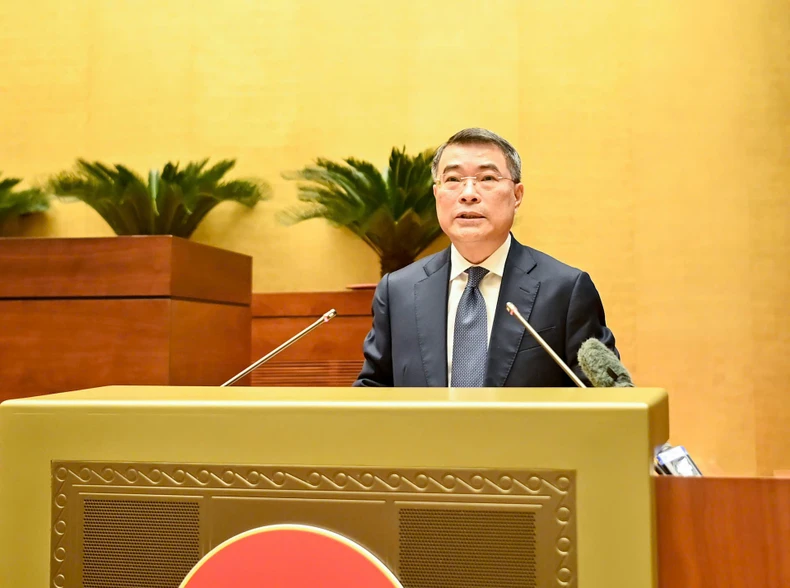
Comrade Le Minh Hung introduced the topic of continuing to streamline the organization to be lean, efficient, effective and efficient.
The functions, tasks and organizational structure of local governments are implemented according to Government regulations, in the direction of promoting decentralization from the Government, ministries and branches to local governments, in accordance with capacity and management requirements.
Regarding the Party organization at the provincial and communal levels, the Party Central Committee agreed to establish local Party organizations corresponding to the provincial and communal administrative units; ending the activities of district-level Party Committees. The Party organization model at the provincial level is basically the same as it is now; Party organizations at the commune, ward, and special economic zone levels (abbreviated as commune level), the commune-level Party Committee is the political nucleus, directly and comprehensively leading the commune, ward, and special economic zone levels...
The Party Central Committee agreed to the policy of arranging, streamlining, and merging the agencies of the Vietnam Fatherland Front, socio-political organizations, and mass organizations assigned by the Party and the State at the central, provincial, and communal levels. The Central Committee also agreed to the policy of ending the activities of civil servant unions and armed forces unions and reducing the level of union dues paid by union members. At the same time, the Politburo agreed to the policy of holding congresses of the Vietnam Fatherland Front and socio-political organizations immediately after the Party Congresses at each level; the Central level will hold the congress after the National Party Congress and elect National Assembly deputies.
Highest determination to complete the set goals
Speaking at the conference, General Secretary To Lam stated that, along with the content of the direct dissemination at the conference, the documents have been, are being, and will be sent to ministries, branches, and localities as soon as possible for implementation (basically, in April 2025, all guiding documents will be issued). Along with that, the full draft of the 4 documents submitted to the 14th National Party Congress will also be sent for ministries, branches, and localities to comment and serve as a basis for building documents at their level. Basically, the policy is clear, the plan, schedule, and implementation roadmap are specific. This is a new point in organizing the dissemination and implementation of the Party's resolutions in the direction of clearly defining the person, the work, the way of doing, the responsibility, and the completion time, so that implementation can begin immediately after the conference.
The General Secretary suggested that after this conference, Party committees and organizations at all levels have the responsibility to continue to study and fully, thoroughly and carefully grasp the contents of the Resolution of the 11th Central Conference, Session XIII and develop specific action plans and programs for implementation. It is necessary to determine the highest political determination in leading and directing the implementation of the resolution, identifying this as a "revolution" in the arrangement of the apparatus, the arrangement of administrative units and reform and innovation for the development of the country.
Implement the work in the spirit of "running and lining up at the same time", but must be careful, certain, methodical, not hasty, subjective; have priority order, do each job firmly, do this job must take into account other related work; follow the correct procedures according to regulations, do not cut corners, do it carelessly, do it roughly any job. Stick to the time milestones in the plan, ensure the work is done on schedule.
Strengthening information and propaganda to create consensus in society, fully promoting the people's right to mastery, respecting and listening to people's opinions. The processes and procedures for collecting people's opinions must be carried out in accordance with regulations, especially those related to amending and supplementing the 2013 Constitution, merging provinces and merging communes.
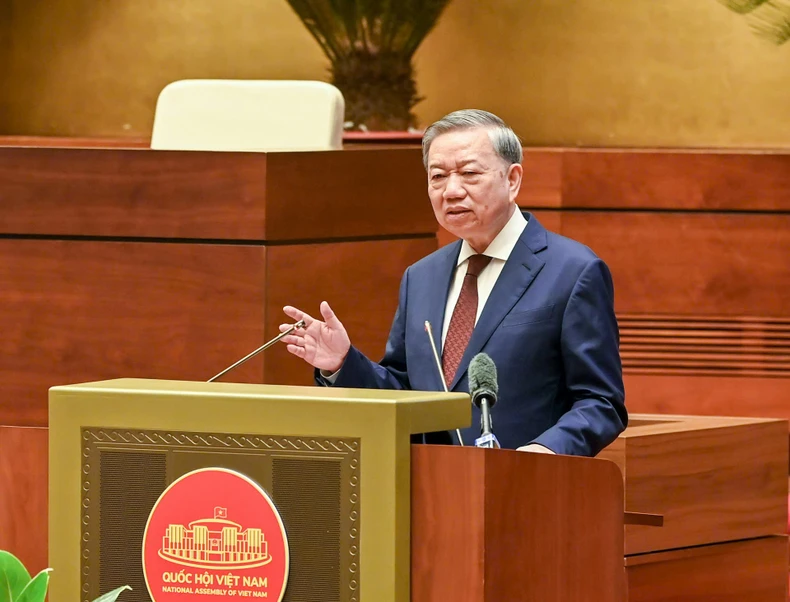
General Secretary To Lam delivered a speech at the conference.
Requiring localities to be proactive and responsible in developing plans to arrange administrative units at the commune and ward levels, the General Secretary noted the need to overcome two trends: Merging communes and wards that are too large like a "miniature district level" leads to not being able to manage the area, not being able to proactively serve the people, leading to turning the policy of not organizing at the district level into not organizing at the commune level. Or, merging communes and wards that are too small leads to limitations in space, development space, and more focal points, leading to cumbersomeness and inefficiency. These are issues that the Standing Committees of the provinces must discuss and calculate very carefully in the spirit of a long-term vision, for the country and for the people.
The General Secretary paid special attention to the selection and arrangement of leaders, especially heads of provincial and communal agencies after the merger. The selection and arrangement of leaders of local agencies after the merger is the responsibility of the Standing Committee of the Party Committee according to decentralization. There must be discussion and agreement to arrange "the right person, the right job" in accordance with the spirit of Conclusion No. 150-KL/TW of the Politburo on guidelines for building personnel for provincial Party Committees subject to merger and consolidation and newly established communal levels.
It is necessary to calculate synchronously and interconnectedly between all four stages: Arranging cadres after the merger; personnel for provincial and communal party congresses; personnel for the 14th Party Congress; personnel for the election of the National Assembly and people's councils at all levels. The first criterion for arranging cadres is based on job requirements, followed by other criteria. Those who feel they do not meet the requirements should voluntarily withdraw, making way for more deserving people.
Regarding the organization of party congresses at all levels, the General Secretary emphasized that it is necessary to ensure strict and systematic compliance with the spirit of Directive No. 45-CT/TW of the Politburo, especially in newly merged and consolidated localities; it is necessary to attach more importance and focus on the preparation of documents (some places are showing signs of underestimating this issue, mainly focusing on personnel plans). Although the merger has not been officially completed, it is necessary to think and reflect to propose development guidelines for the newly established province and commune based on the new space, land and resources. This is a very important task that requires intellectual investment, effort and close coordination among localities to carry out this work well.
Affirming that the work ahead is very complicated and must be very urgent, the General Secretary requested comrades from the Central to the grassroots level present at the Conference to thoroughly implement the Resolution of the 11th Central Conference, 13th tenure, promote the highest sense of responsibility before the Party, State and people, focus on leadership and direction with the highest determination to complete the set goals, prepare a solid foundation for the 14th National Party Congress, and firmly bring the country into the era of rising up and developing the prosperity of the Vietnamese people.
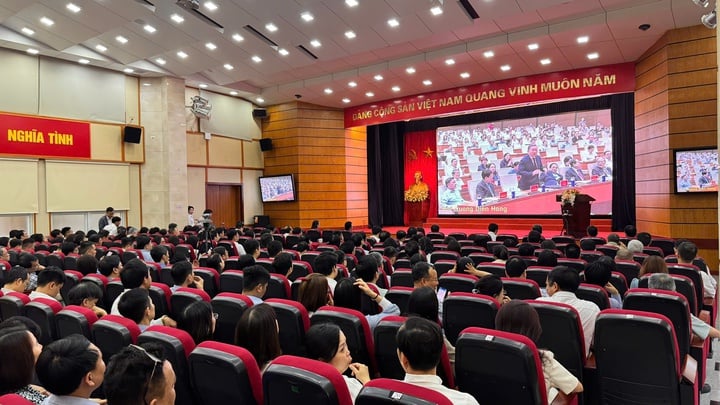
Bridge point: Headquarters of Ministry of Science and Technology
In his closing speech at the conference, Comrade Nguyen Trong Nghia, Politburo member, Head of the Central Propaganda and Mass Mobilization Commission, emphasized that, in the spirit of the General Secretary's direction today, he requested Party committees, Party organizations, authorities, the Fatherland Front, and socio-political organizations to focus on leading, directing, and implementing propaganda work, thoroughly disseminating widely, synchronously, effectively, closely linked to the political tasks of each locality, each agency, and unit; strengthen orientation, promptly fight to contribute to creating unity in perception and action so that the entire political system can create consensus in society, light up the flame of belief, and bring the Party's policies into life.
Source: https://mst.gov.vn/hoi-nghi-toan-quoc-quan-triet-trien-khai-thuc-hien-nghi-quyet-hoi-nghi-trung-uong-11-khoa-xiii-197250416172259004.htm



![[Photo] The parade took to the streets, walking among the arms of tens of thousands of people.](https://vphoto.vietnam.vn/thumb/1200x675/vietnam/resource/IMAGE/2025/4/30/180ec64521094c87bdb5a983ff1a30a4)
![[Photo] Mass parade to celebrate 50 years of national reunification](https://vphoto.vietnam.vn/thumb/1200x675/vietnam/resource/IMAGE/2025/4/30/825e459ee2f54d85b3a134cdcda46e0d)
![[Photo] Panorama of the parade celebrating the 50th anniversary of the Liberation of the South and National Reunification](https://vphoto.vietnam.vn/thumb/1200x675/vietnam/resource/IMAGE/2025/4/30/affbd72e439d4362962babbf222ffb8b)

![[Photo] "King Cobra" Su-30MK2 completed its glorious mission on April 30](https://vphoto.vietnam.vn/thumb/1200x675/vietnam/resource/IMAGE/2025/4/30/5724b5c99b7a40db81aa7c418523defe)



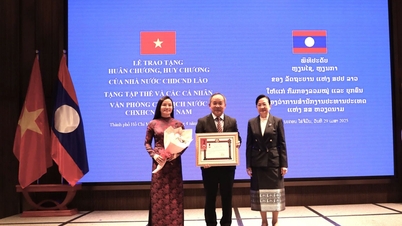
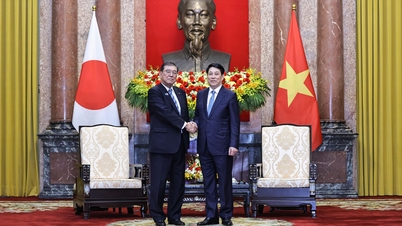





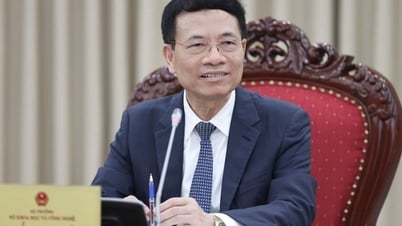

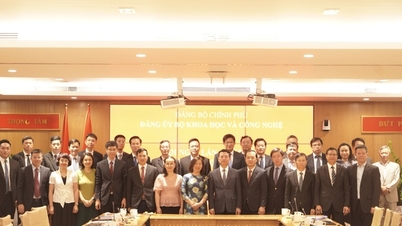







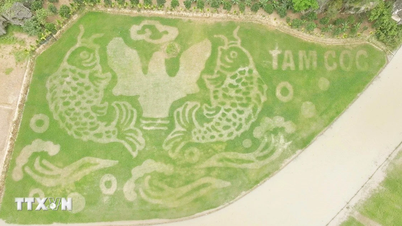








































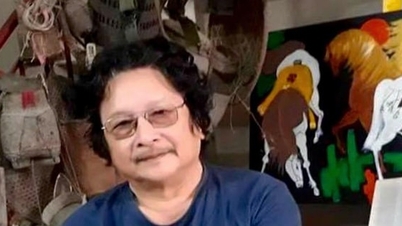

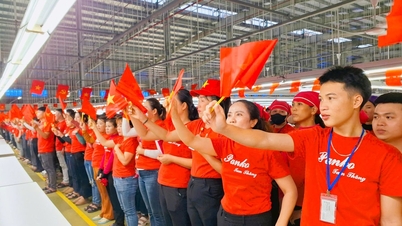



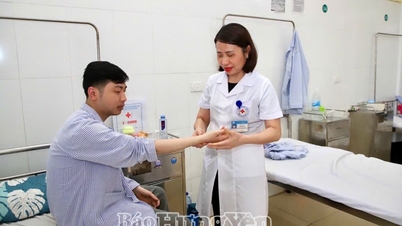

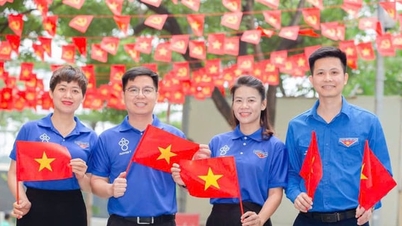
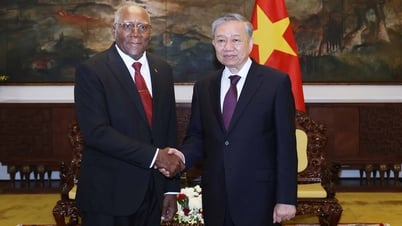











Comment (0)